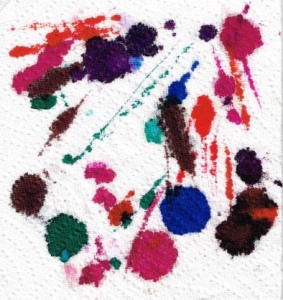My handwriting sucks. Here’s a sample:

This is why I do nearly all my first-drafting in longhand: because I can’t read my own writing unless I slow way down and focus on each word.
It took me a while to figure out why I’d sometimes get so blocked — paralyzed! — when I did nearly all my writing on the computer. Maybe it’s because I’m an editor as well as a writer, or maybe it’s because I’m a recovering perfectionist who has occasional slips, but sometimes I’d stare at those crystal-clear words on the screen and think, No, that’s not right, and then get stuck trying to fix it instead of moving on.
Eventually I figured out that the best way to break through these blocks was to grab a pad of paper and a pen and get away from the computer. At the top of the paper I’d writing something like “I can’t write this scene because . . .”
And out would flow whatever I needed to know, and eventually the scene itself.
This was also a handy way of getting to know characters better. Whatever I wrote in longhand on a yellow pad wasn’t part of The Manuscript. I loosened up. No pressure. I could write anything I wanted.
My messy handwriting was an asset. What the internal editor couldn’t read, she couldn’t edit. Without the internal editor looking over my shoulder, I could write write write, not expecting anything to be perfect, knowing that there would be a second or third or fourth draft to get it just right.
So why wait till I got stuck to bring out the pen and paper? Why not start out that way?
I tried it. It worked. It’s still working. I do most of my first-drafting in longhand.
Pretty soon, however, the scrawl of a ballpoint pen across lined yellow paper was looking rather dull. I started acquiring fountain pens and bottles of different colored ink. I’ve currently got about a dozen of each. It’s a little ridiculous, but I couldn’t live without them.
The bonus is that ink blottings on paper towels are really pretty. I use them as coasters for my tea mugs and my beer steins. They make me happy.


Those colorful blotches could easily pass for abstract painting – voila! Another career!
LikeLiked by 1 person
They started off as “accidental art,” but now I do a little planning. Like I buy only plain white paper towels, and sometimes I’ll switch pens if I think a blotter needs more of this or that color. 🙂
LikeLike
Since there were no computers for many years while I was writing in my youth, I wrote longhand. Actually, I printed my stories in pencil. When computers came out, I still found word processing a problem for my creative writing, even though I could type really well. I was used to seeing the whole page at one time, and seeing the physical location of each page relative to the whole.
At some point, something changed (maybe because I spent so much time typing up my work?); I began to be able to create from behind the keyboard. Now, I literally “think” through my fingers at the keys. (If I can’t think of how to say something verbally, I position myself over the keyboard and it comes to me–clearly, due to too many years of my adult life spent in social isolation, writing in the basement late at night.) I’m also an editor–always was one at heart–and I edit as I write because I believe writing and editing are two sides of the same coin: the editor hat does not work against the writer hat, but with it. The mechanics work together with creativity to produce that which I want to say in the best possible way. Of course, there are many rewrites and edits afterward anyway, but I do still need to edit as I go–even during NaNoWriMo!
I enjoyed your post.
LikeLiked by 1 person
For me a big part of writing is getting out of my own way. 🙂 Making it hard to second-guess myself on the fly helps a lot. When I’m first-drafting, I don’t need to hear from the part of my brain that’s so good at line/copy editing and proofreading. It’s like driving with the brakes on. As an editor, though, I rarely take on (paid) jobs that involve substantive editing because this seems to come out of the writer part of my brain. I often get new ideas and work out snags when I’m kneading bread, walking in the woods, or doing something else that isn’t (physically) writing. Substantive editing jobs tend to absorb the attention that I’d rather devote to my own stuff.
LikeLiked by 1 person
It’s true, new ideas or development of ideas tend to come from doing something else that doesn’t occupy the mind (kneading bread, a walk, housework, a shower, listening to music). That’s why I don’t really understand writer’s block. If a writer is staring at the page/screen, writer’s block can occur. But as soon as you change the environment, ideas come streaming (at least if you’re a writer through and through).
That’s interesting about substantive editing jobs, but I can see how that would happen. Copy editing is very different from substantive, where you have to become the story–someone else’s story.
LikeLike
I have enjoyed reading this.
LikeLike